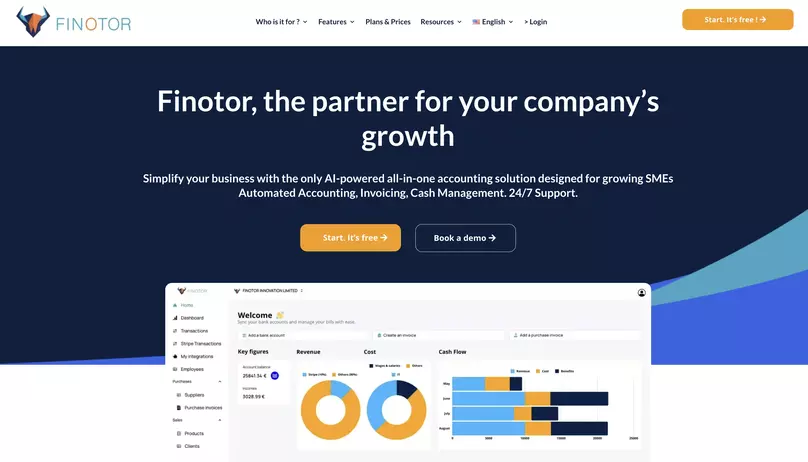Contents
 Tax planning and preparation is an essential aspect of managing your finances. It involves understanding the tax laws and regulations that apply to your income and assets, and taking steps to minimize your tax liability. This can be done by taking advantage of deductions, credits, and other tax-saving strategies.
Tax planning and preparation is an essential aspect of managing your finances. It involves understanding the tax laws and regulations that apply to your income and assets, and taking steps to minimize your tax liability. This can be done by taking advantage of deductions, credits, and other tax-saving strategies.
With this article Finotor wants to provide a comprehensive introduction to tax planning and preparation. It covers the importance of tax planning for individuals and companies, how to prepare taxes for tax planning, and how to manage tax deductions and credits. The article also includes tips for avoiding penalties and interest charges and for maximizing tax savings. It is a useful guide for anyone looking to better understand the tax laws and regulations that apply to their income and assets and how to minimize their tax liability. The article is well-researched and provides practical advice that can be easily understood and applied. It is perfect for anyone looking to take control of their finances and make the most of their hard-earned money.
Why is Tax Planning Important?
Tax planning is important for a company because it can help the business to minimize its tax liability and maximize its profits. By understanding the tax laws and regulations that apply to the business, the company can take advantage of deductions, credits, and other tax-saving strategies.
Effective tax planning can also help a company to manage its cash flow by identifying potential tax liabilities and making arrangements to pay them in a timely manner. Additionally, tax planning can assist a company in making strategic business decisions by taking into account the potential tax implications of different options.
Proper tax planning can also help companies to avoid penalties and interest charges that can be imposed for non-compliance with tax laws and regulations. By staying informed of changes in tax laws and regulations and planning accordingly, companies can ensure they are in compliance and avoid any legal or financial penalties.
So, tax planning is important for a company because it can help to minimize taxes, manage cash flow, make strategic business decisions, and avoid penalties and interest charges. It is a process that helps companies to be financially stable, grow and stay compliant with laws.
What types of tax planning exist for a company ?
There are several types of tax planning that a company can engage in to minimize their tax liability. Some common types include:
- Strategic use of deductions and credits: Companies can take advantage of deductions and credits for things like business expenses, employee benefits, and research and development.
- Deferring income: Companies can defer income by delaying the receipt of payment for goods or services until the following tax year.
- Accelerating deductions: Companies can accelerate deductions by paying expenses before the end of the tax year.
- Tax-efficient entity structure: Companies can choose the entity structure that is most tax-efficient for their business, such as a C corporation, S corporation, partnership, sole proprietorship or a Limited.
- International tax planning: Companies that operate internationally can take advantage of tax treaties, transfer pricing rules, and other strategies to minimize their global tax liability.
- Retirement plan: Companies can offer retirement plans to their employees and deduct contributions made to the plan.
- Estate and gift tax planning: Companies can also take advantage of tax planning opportunities related to the transfer of assets through estate and gift tax laws.
- State and local tax planning: Companies can also engage in tax planning to minimize their state and local tax liability by considering the tax rates and laws of the states in which they operate.
How preparing Your Taxes for Tax Planning in a company ?
When preparing your taxes, it is important to gather all of the necessary documentation, such as W-2 forms, 1099 forms, and other income and expense records. You will also need to determine your filing status and determine which tax forms you need to file.
Preparing your taxes for tax planning in a company involves several steps, including:
- Gathering necessary documentation: This includes financial statements, receipts, invoices, and other records that are needed to support deductions, credits, and other tax-saving strategies.
- Reviewing financial statements: It is essential for the company to review its financial statements and identify areas where deductions or credits may be available.
- Identifying tax laws and regulations: It is important to understand the tax laws and regulations that apply to the business, including any changes or updates that may have occurred in the current tax year.
- Identifying tax-saving strategies: Companies can take advantage of deductions, credits, and other tax-saving strategies to minimize their tax liability. These strategies may include expensing certain business expenses, taking advantage of tax incentives or credits, and planning for retirement plans.
- Choosing the right tax preparation method: Companies have several options for preparing their taxes, such as hiring a tax professional, using tax software, or using online tax preparation services. It is essential for the company to choose the method that best suits its needs.
- Reviewing and filing taxes: Once the company has gathered all necessary documentation, identified tax-saving strategies, and chosen a tax preparation method, it must review and file its taxes. It is important to ensure that all forms are filled out correctly, and all deadlines are met to avoid penalties and interest charges.
It’s important to note that preparing taxes for tax planning in a company may require the help of a tax professional, especially for more complex situations. It’s also important to note that tax planning is an ongoing process that should be reviewed regularly to ensure that the company is taking advantage of all available tax-saving opportunities.
How to manage the Tax Deductions and Credits for a company ?
Managing tax deductions and credits for a company can be accomplished by implementing the following steps:
- Research: Research the various deductions and credits that are available to your company. This can be done by reviewing the IRS website, consulting with a tax professional, or reviewing industry-specific publications.
- Identify Eligibility: Determine which deductions and credits your company is eligible for. This may depend on the type of business you operate, the size of your company, and other factors.
- Keep Records: Keep detailed records of all expenses and income that may be used to claim deductions and credits. This includes invoices, receipts, bank statements, and other financial records.
- Plan Ahead: Tax planning should be an ongoing process, therefore make sure to plan ahead by forecasting your company’s future expenses and income. This will help to identify opportunities to take advantage of deductions and credits.
- Use Software : Use accounting software to track expenses and income, and to prepare financial statements. This will make it easier to identify deductions and credits, and to prepare your tax returns.
- Consult a Tax Professional: Consult with a tax professional who can provide guidance on which deductions and credits are available to your company, and help you to maximize your tax savings.
- Review and File: Once you have identified the deductions and credits that apply to your company, review your tax returns to ensure that they are complete and accurate. Be sure to file your returns on time and pay any taxes owed in a timely manner to avoid penalties and interest charges.
By researching and identifying the deductions and credits that apply to your company, keeping detailed records, planning ahead and consulting a tax professional, companies can effectively manage their deductions and credits to minimize their tax liability and maximize their profits.
Conclusion
In conclusion, tax planning and preparation is a crucial step in managing your finances and ensuring that you’re taking full advantage of the tax benefits that are available to you. By understanding the tax laws and regulations that apply to your income and assets, you can minimize your tax liability and keep more of your hard-earned money. Additionally, by gathering all necessary documentation, determining your filing status, and choosing the best option for you to file your taxes, you can ensure that your taxes are done correctly and on time. It’s also important to take into account the deductions and credits that may apply to your specific situation. With the right planning and preparation, you can rest easy knowing that you’re making the most of your financial situation. Remember, tax planning is an ongoing process and should be reviewed regularly to ensure that you’re always taking advantage of available tax-saving opportunities.









